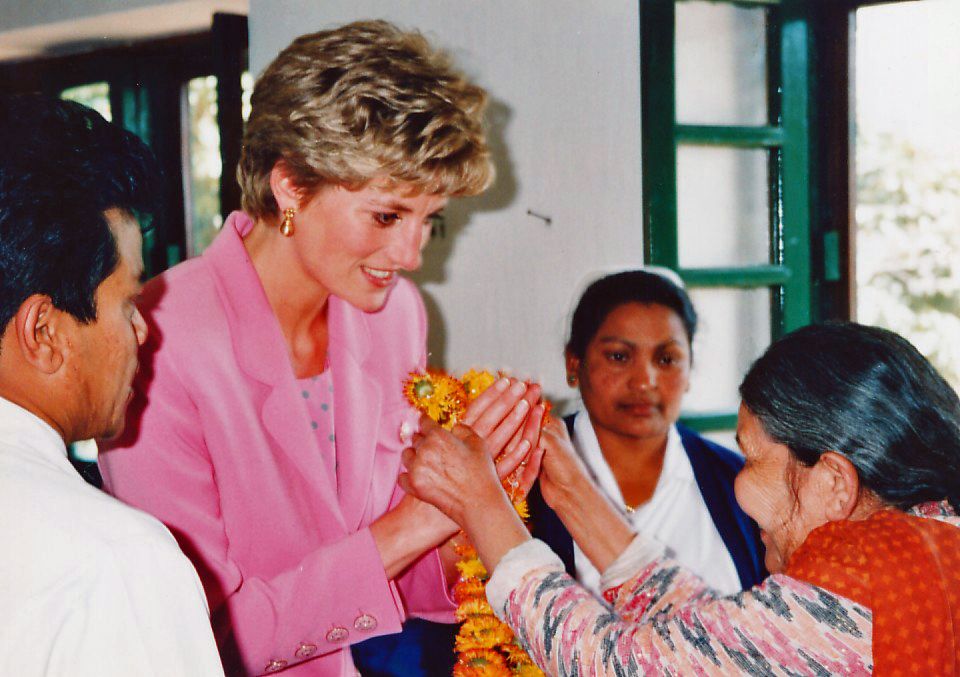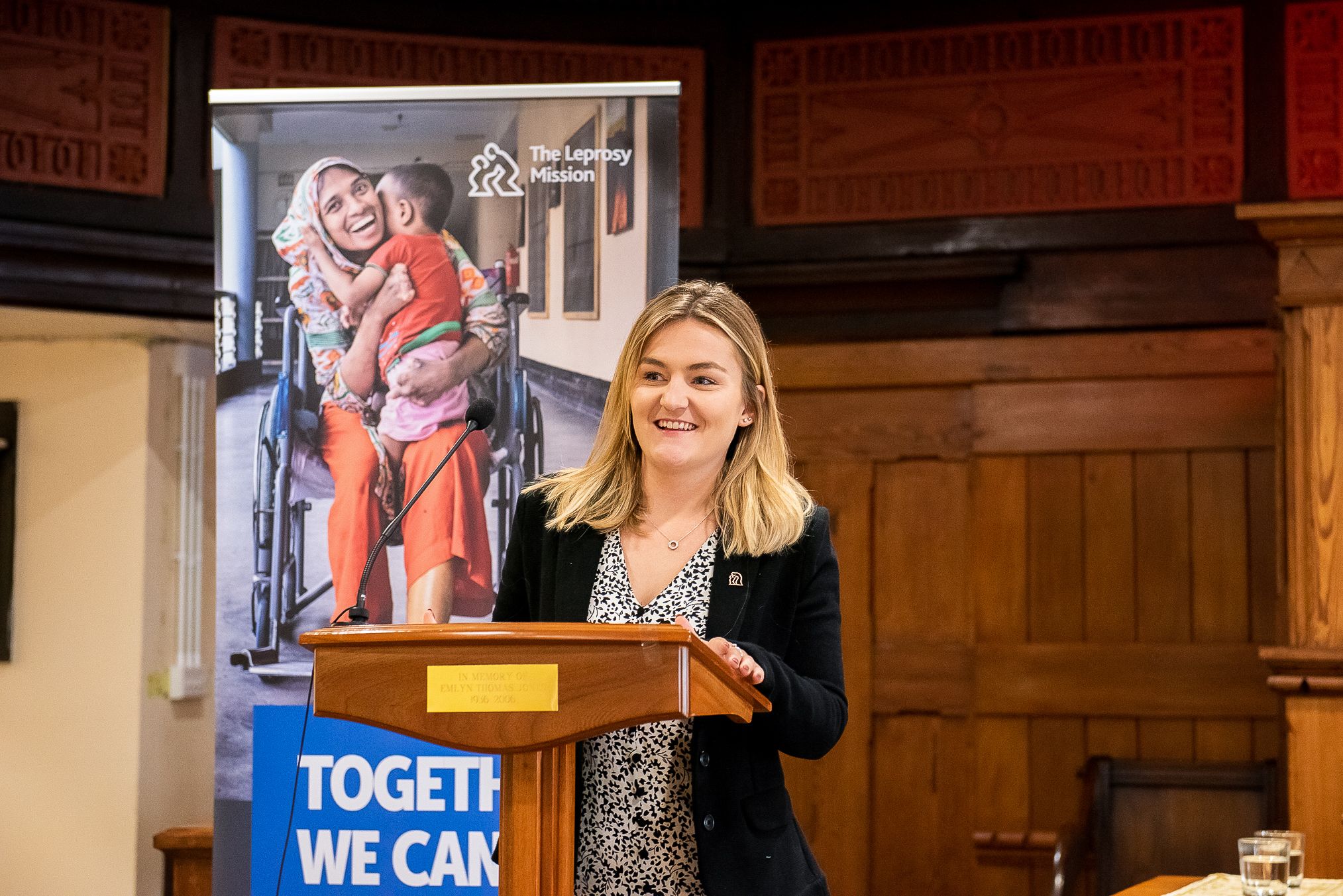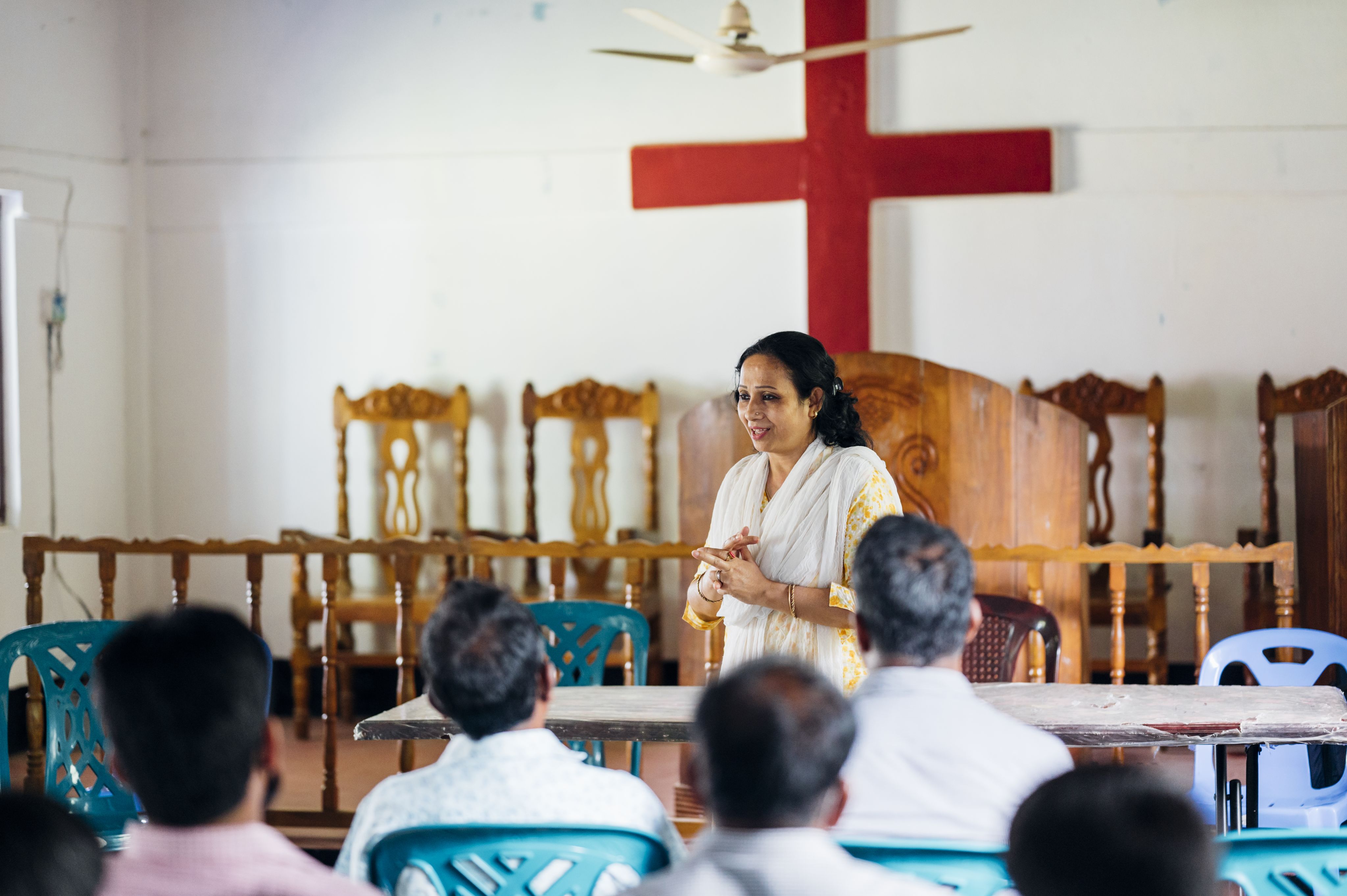The Leprosy Mission England and Wales
Impact Report 2022
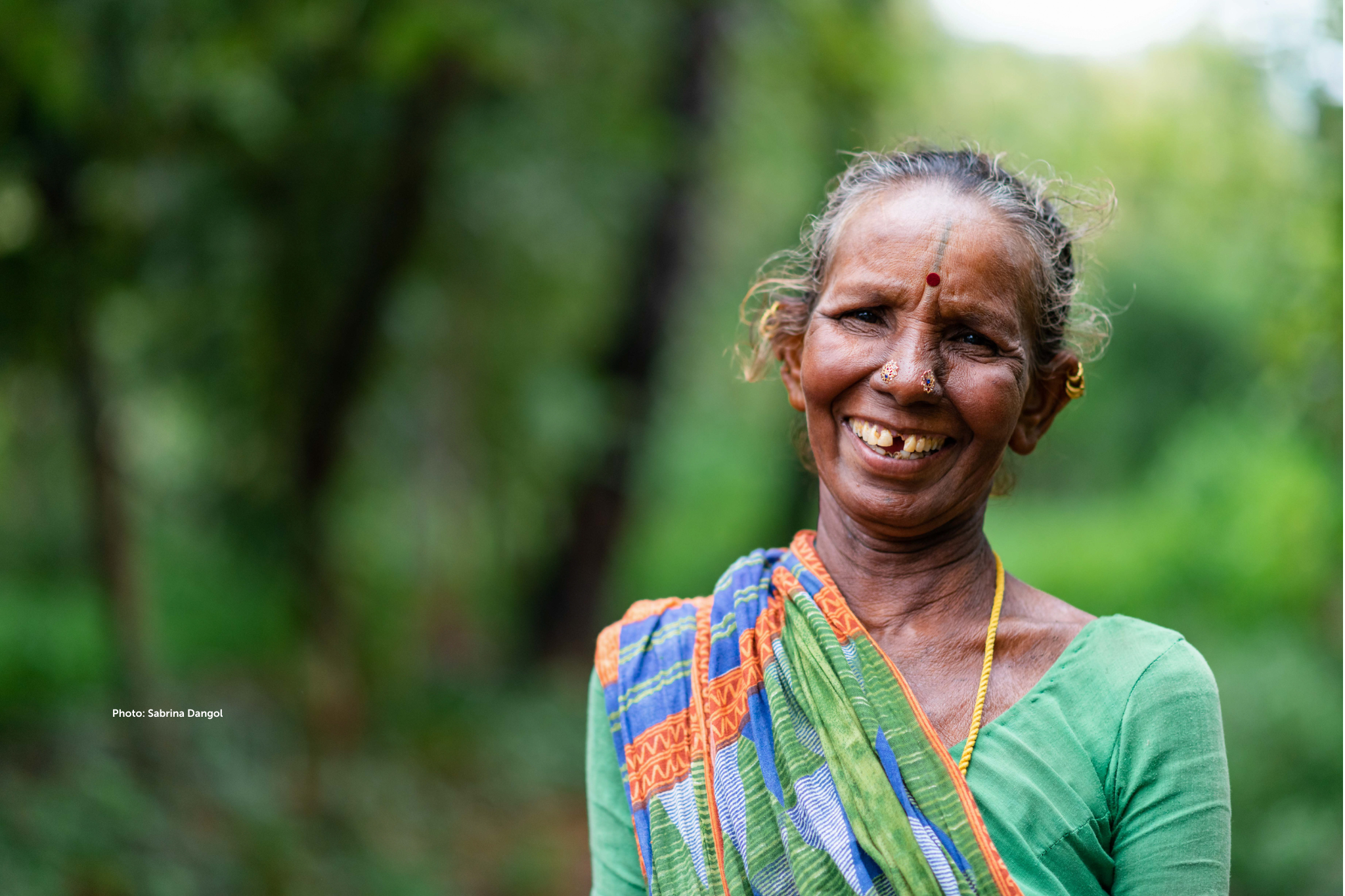
Welcome
2022 marked 40 years since the roll out of a new wonder drug to cure leprosy. Since 1982, millions have avoided a lifetime of disability by taking Multidrug therapy.
The winning combination of three antibiotics is as much a gamechanger today as it was in 1982. Because of your generosity, many thousands of people were cured of leprosy last year with these drugs. You have given the wonderful gift of a life free from disability or prejudice.
Thank you too for walking with those who sadly weren’t cured quickly. Many have had to endure life-changing disabilities and terrible discrimination because of leprosy. But because of you they know they're not alone. You have been there for them. You have given them specialist care, surgery, prosthetic limbs, schooling and job training. You have shown love and offered hope.
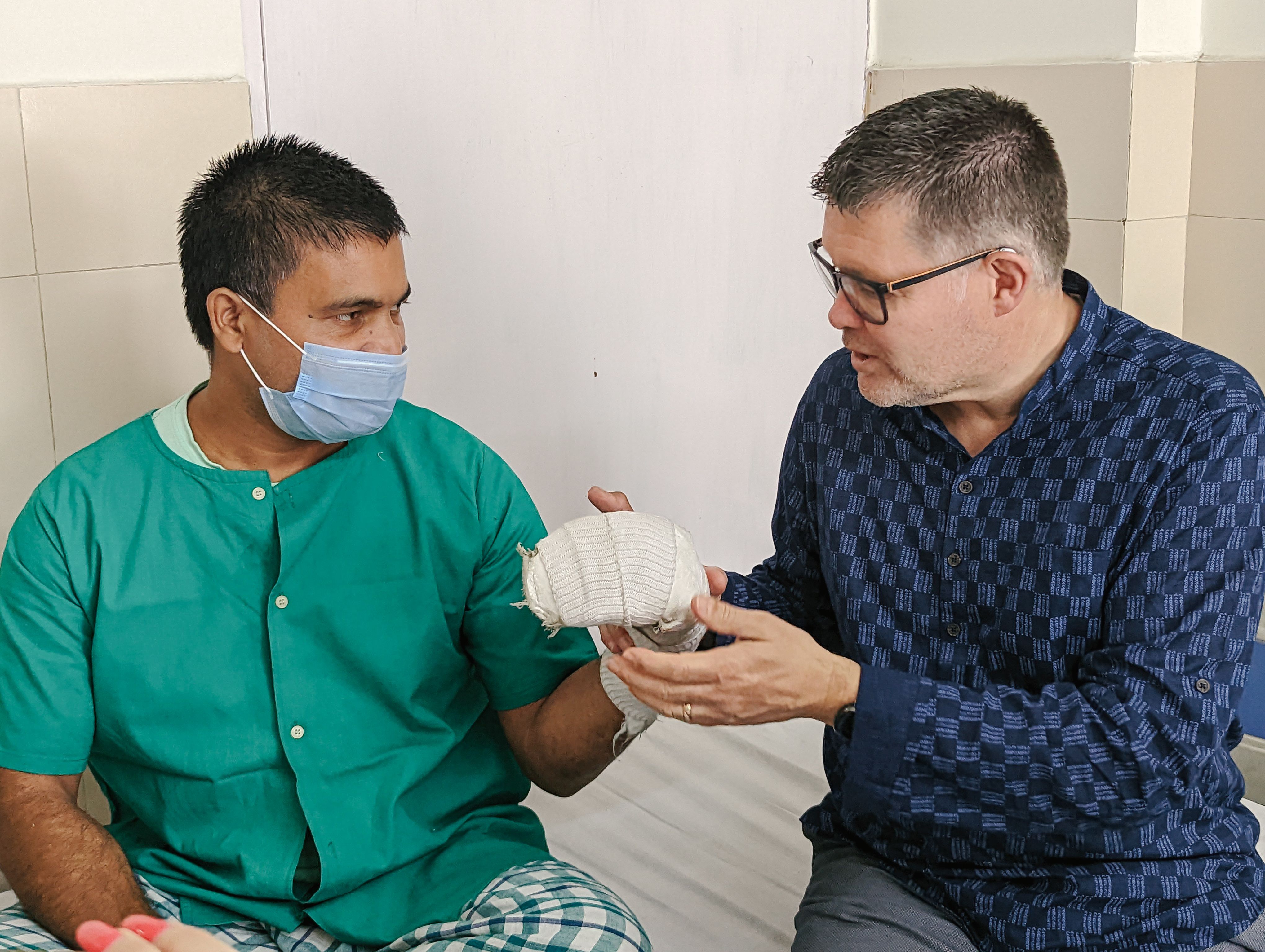
Chief Executive Peter Waddup chats with Inul Haqul, a leprosy patient at Premananda Hospital in Kolkata, India.
It is a cruel injustice that leprosy even exists today. If the money and political will had been there it would have been consigned to the history books long ago. I thank you from the bottom of my heart for joining the fight against leprosy. By doing so you are standing with the world’s poorest and most marginalised communities.
You have brought us a step nearer to ending leprosy once and for all!
Thanks to your wonderful response to the Greater Heights Appeal, we can build a new Research Centre. Building work on the facility at our flagship hospital in Nepal begins this summer. From the foothills of the Himalayas, ground-breaking research will take place. New diagnostic tests and treatments needed to end leprosy will be pioneered. I am so excited to share this news in our impact report.
2022 served as a reminder of how life can change in a moment. The global sense of freedom felt after the pandemic was cut short. Many were now imprisoned by the shackles of war and rising poverty. Last year saw millions of lives blighted by political unrest, famine and climate disasters. From the worst famine in Ethiopia since Live Aid to brutal conflict in Myanmar, there is no freedom for many.
People affected by leprosy are always caught in the middle of these disasters. They are always the last to be reached, the first to go hungry and the ones left struggling to rebuild their lives. Through your prayer and giving, you have helped so many in their greatest hour of need.
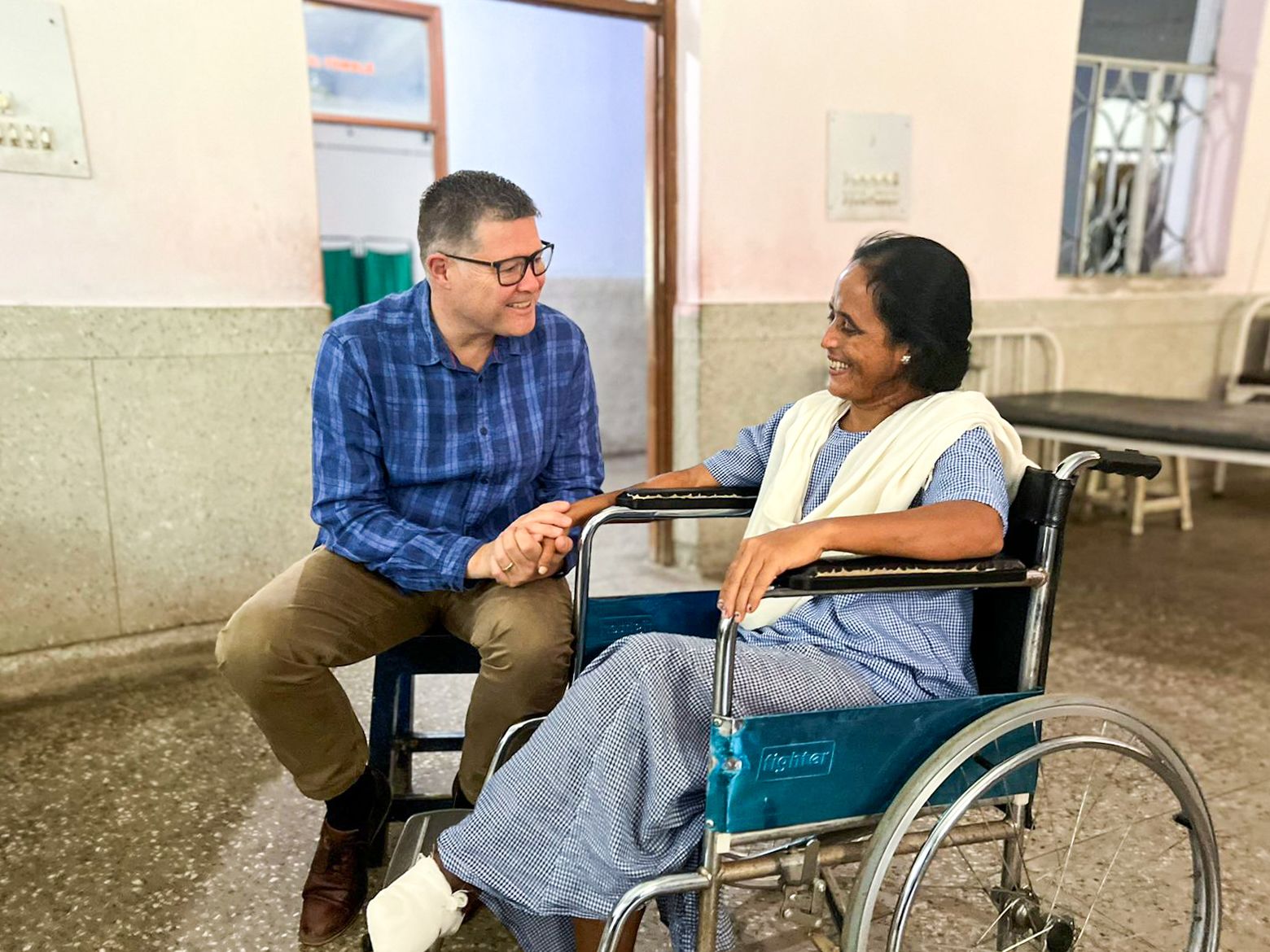
Peter Waddup meeting Doli Das, a leprosy patient at Purulia Hospital in India
Kindness is never wasted. It is so heartening to see the impact of kindness paid forward. I have had the privilege of visiting many of our projects and have heard the most amazing stories. Stories of people who have suffered the worst hardships and discrimination. Yet many have gone on to do remarkable things themselves. Their gratitude has led them to set up children’s homes, schools and change countless lives! All this is borne out of the kindness of a stranger.
You are that kind stranger. Your gifts continue to give hope and opportunity down the years and generations. Kindness is never wasted, and I am forever grateful for yours.
Peter Waddup
Chief Executive
Our impact
Shining beacons of light and hope in Mozambique
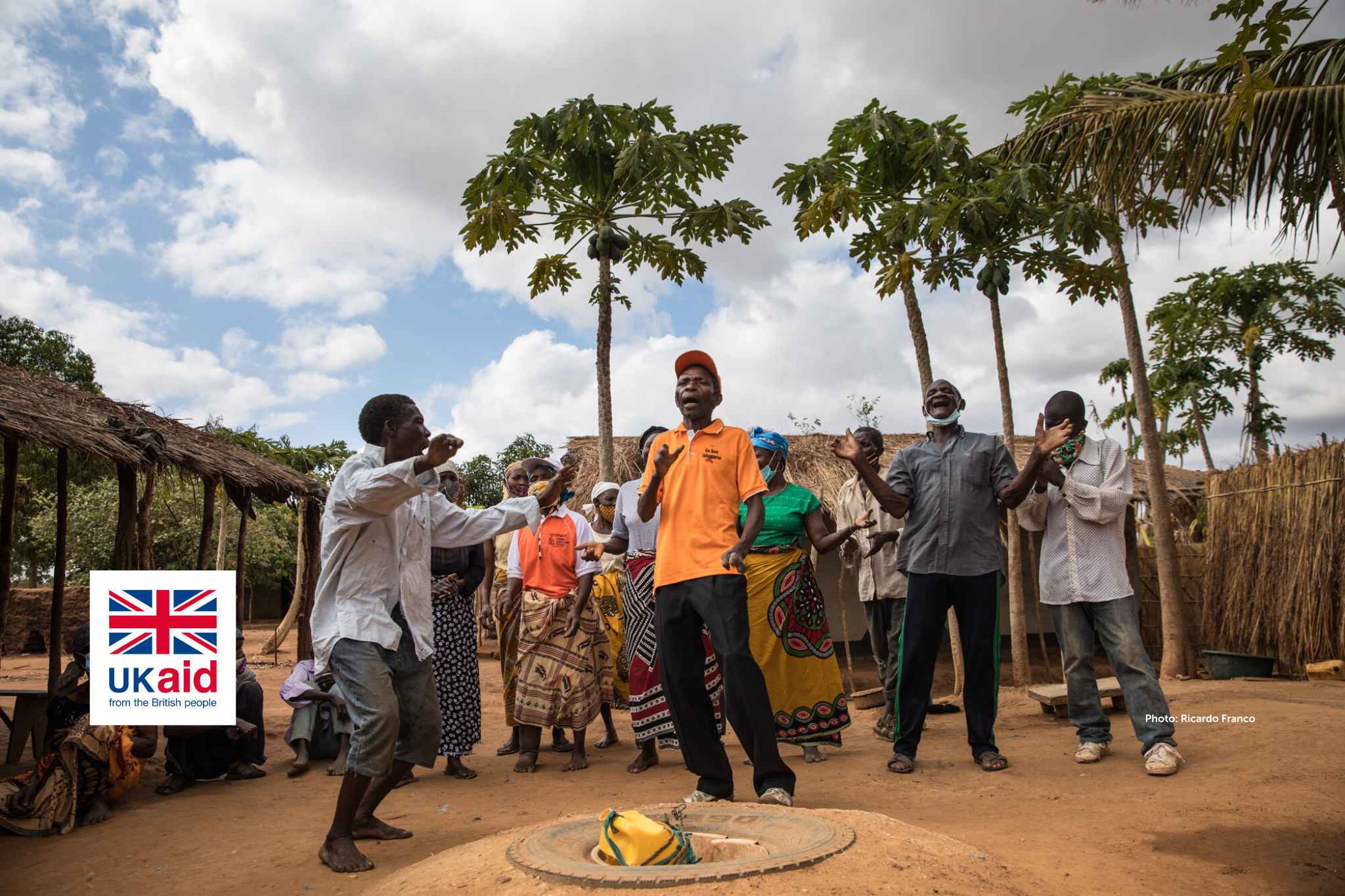
New 'Hubs of Hope' have been built in the troubled northern province of Cabo Delgado, Mozambique, thanks to your gifts. They are places where everyone is welcome and can join together in the fight against leprosy. The hubs are shining beacons of light in the rural communities they serve, and not just metaphorically. They are often the only places lit by electricity!
The Hubs of Hope are powered by solar panels. This enables a low-cost, credit card-sized computer to provide an internet connection. The hubs have become central to daily life in the communities they serve, providing facilities, training, and a safe place for groups to meet to learn or socialise. There is even a sundown film screening at the end of each day for everyone to relax and enjoy.
It was your incredible response to our Unconditional campaign that enabled the construction of these hubs. The campaign was also granted UK Aid Match funding, meaning that every pound you gave was matched by the UK government.
Wonderful breakthroughs were made at the hubs and in our outreach work in 2022. But what is even more extraordinary is that these achievements were made in the middle of a war zone.
For five years people in Cabo Delgado have been surrounded by escalating violence. Men with guns and machetes have attacked communities, killing thousands of civilians. The violence there has forced almost a million people to flee their homes.
Cabo Delgado, Mozambique's most northern province, is a beautiful yet incredibly poor region. It is home to some of the highest rates of leprosy in Africa. People survive through subsistence farming and healthcare is very limited.
Above: Mario is a community leader, and has raised awareness about leprosy throughout villages for 15 years.
Right: Thanks to your gifts, villagers have a place to learn and socialise at Hubs of Hope.
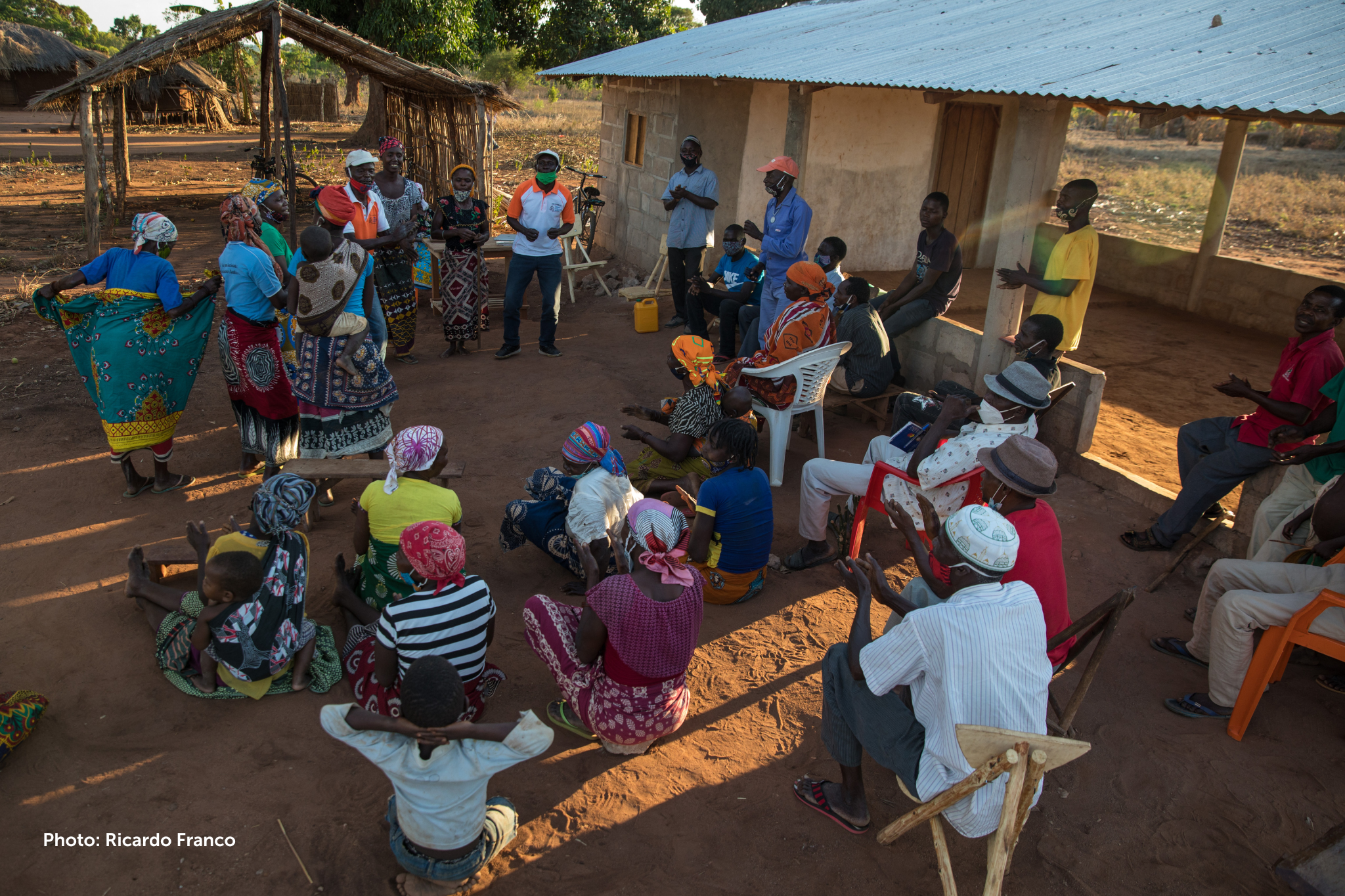
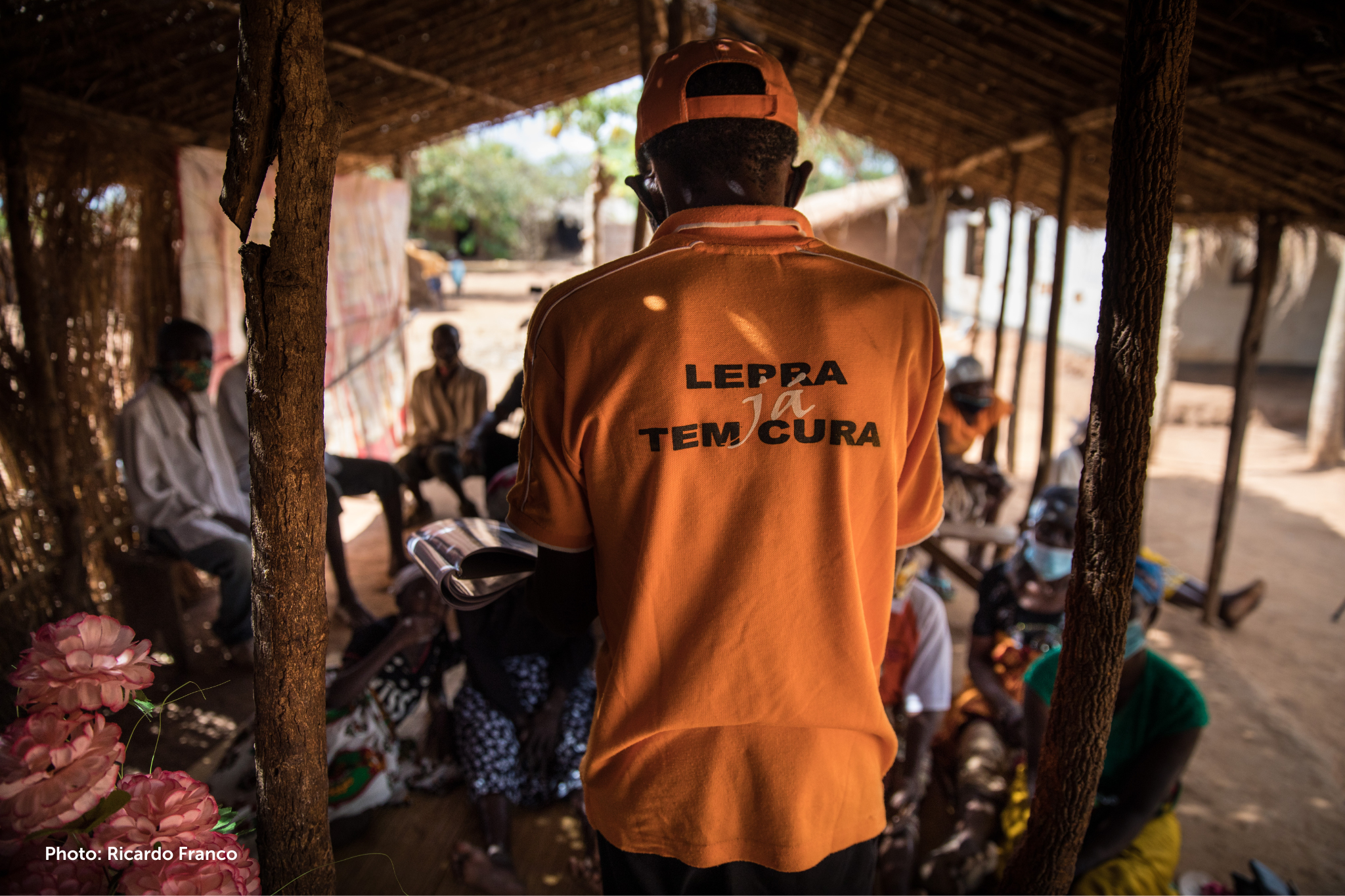
People affected by leprosy often live hand-to-mouth. They rarely have the means to escape violence. Tragically, even when they are able to flee, many struggle to find a new place to settle. They are cruelly discriminated against when they show the physical signs of leprosy and are unwelcome in many communities.
A big part of the work of the hubs is to welcome people affected by leprosy as valued and loved members of the community.
The activities taking place in a Hub of Hope each week include self-care groups. People affected by leprosy get together to check each other’s hands and feet for injuries. A health worker is available to dress any ulcers. This work is so important as it stops people from developing permanent disabilities. Because of you, 800 people affected by leprosy and other neglected tropical diseases are now part of a self-help group.
From the hubs, new volunteers are trained to be Leprosy Changemakers. Their job is to go out and join the fight against leprosy. Changemakers are pillars of the community and come from all walks of life. They can be people cured of leprosy themselves, religious leaders or traditional healers. Through their training they are quickly able to recognise the early signs of leprosy. They can then refer those showing symptoms to a health worker or hospital.
In 2022, Leprosy Changemakers reached out to 5,123 people in community meetings or during house-to-house visits. This amazing team made a huge contribution to the Unconditional project, finding and curing 970 new cases of leprosy!
Through the work of the Hubs of Hope, 854 people are now members of a savings group. Many of these members are farmers who are being trained to mitigate the effects of climate change on their crop yields and to maximise their income at market. The groups also help each other to save so that they can invest in their businesses or pay for family emergencies.
By the time the Unconditional project finishes in March 2025, there will be a total of 32 Hubs of Hope. Your compassion is helping to end leprosy in Mozambique and bring prosperity to its communities for generations to come.
Left: Mario meeting with community members to raise awareness about leprosy.
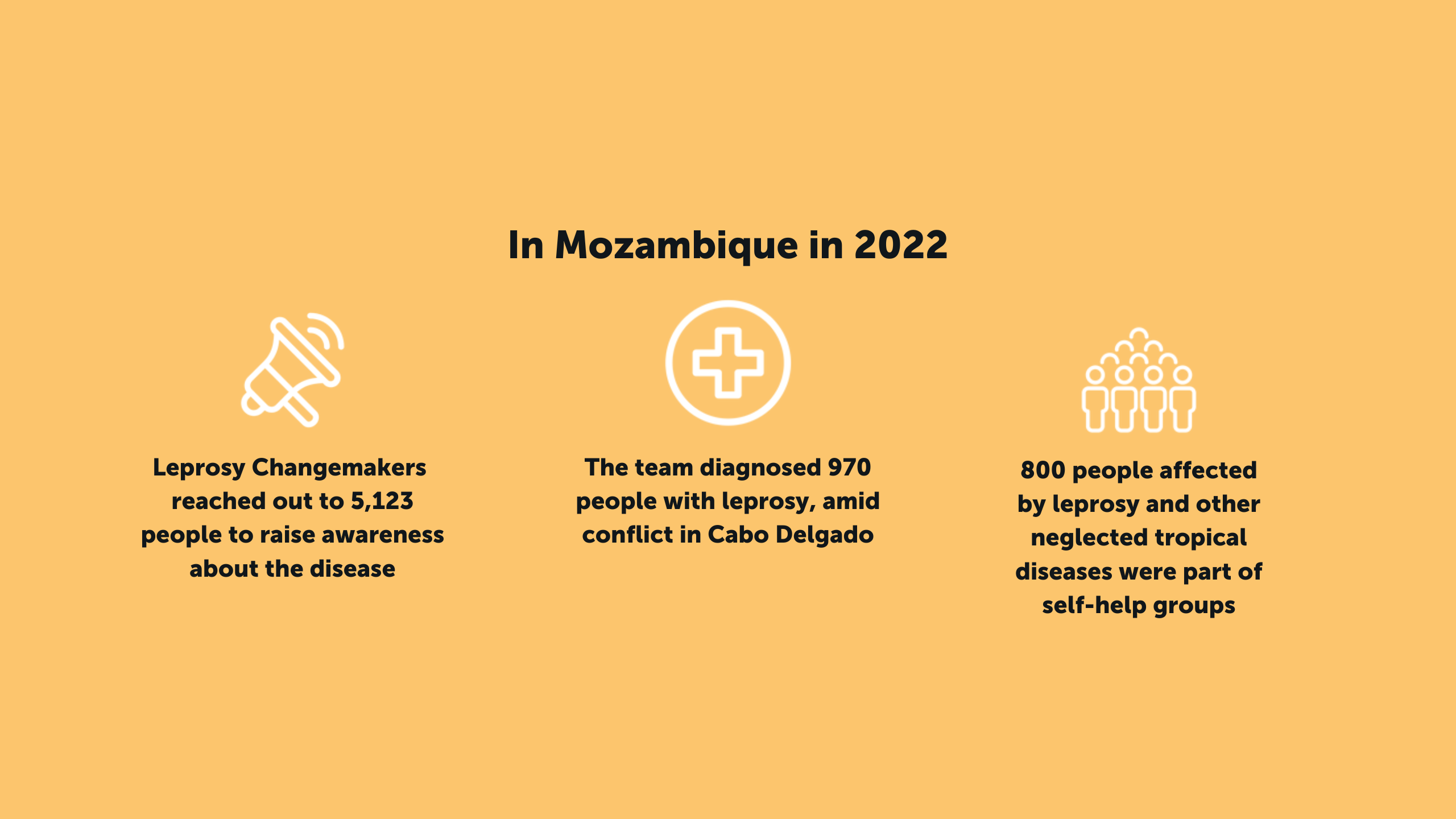

Thank you for giving the gift of sight
It is thanks to you that hundreds of people will receive the gift of sight every year for generations to come! A brand-new surgical unit opened at Chandkhuri Hospital in November. Now life-changing surgery can take place at the hospital again.
Chandkhuri Hospital serves a large and rural, yet extremely poor, area of Chhattisgarh in India. People living in communities surrounding the hospital have no other access to healthcare.
In 2019, the hospital's old operating theatre was not fit for use and wouldn’t have passed a government inspection. Many specialist operations for leprosy complications, including eye surgeries, were no longer possible. Although the quality of the team’s work received praise from the Indian Government, the facilities were holding them back.
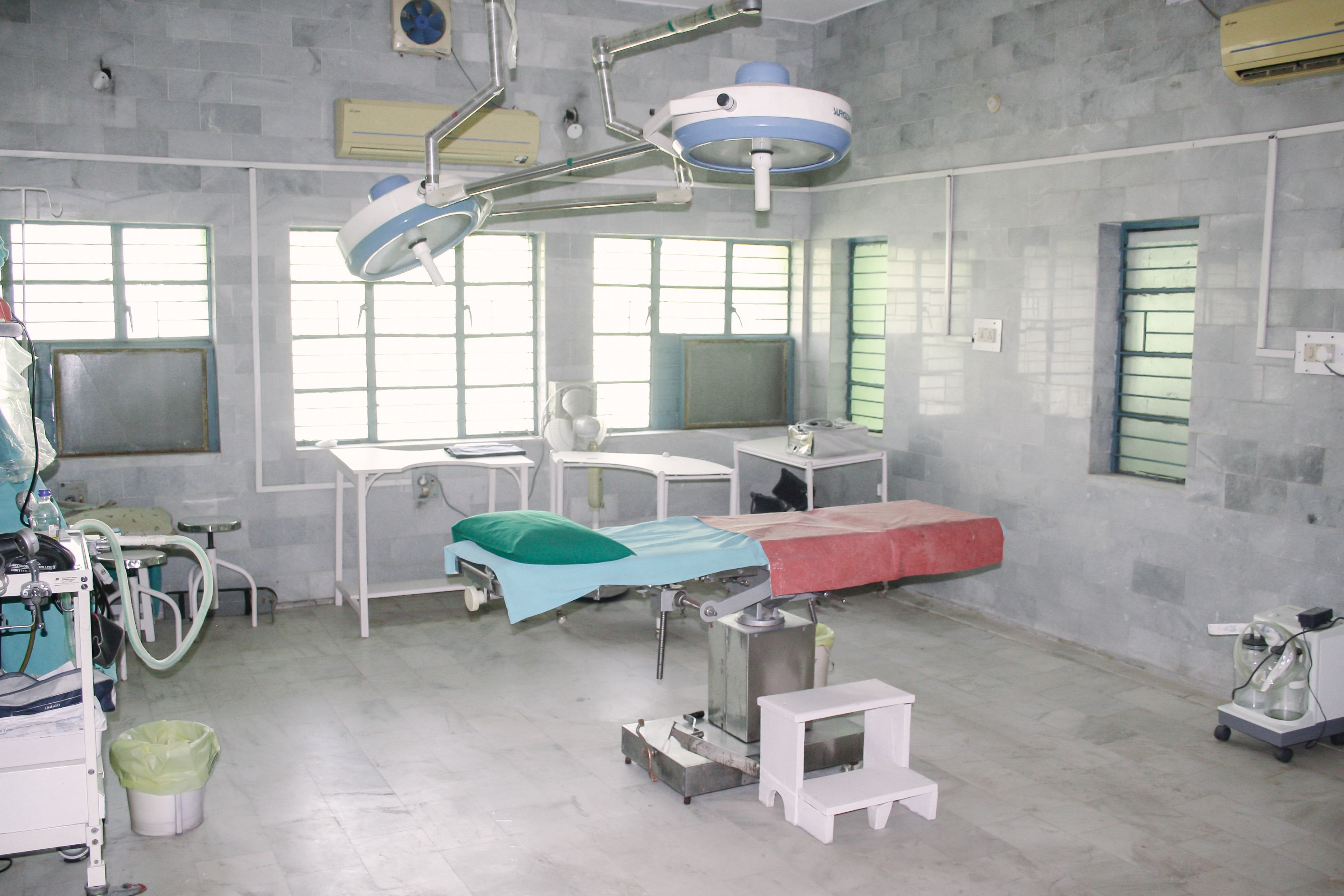
The new operating theatre at Chandkhuri Hospital, enabling the team to continue life-changing surgery here.
We are so thrilled that you chose to fund a new surgical unit. Because of you, 300 people will undergo eye surgery in the new facility in 2023! As well as an ophthalmic theatre, the new surgical unit houses a general operating theatre. It also includes a recovery room, an intensive care unit and a doctors' room and nurses' station.
Thank you for bringing first-class medical facilities to Chandkhuri Hospital. Now the hospital will continue to be a place of love and care for decades to come.
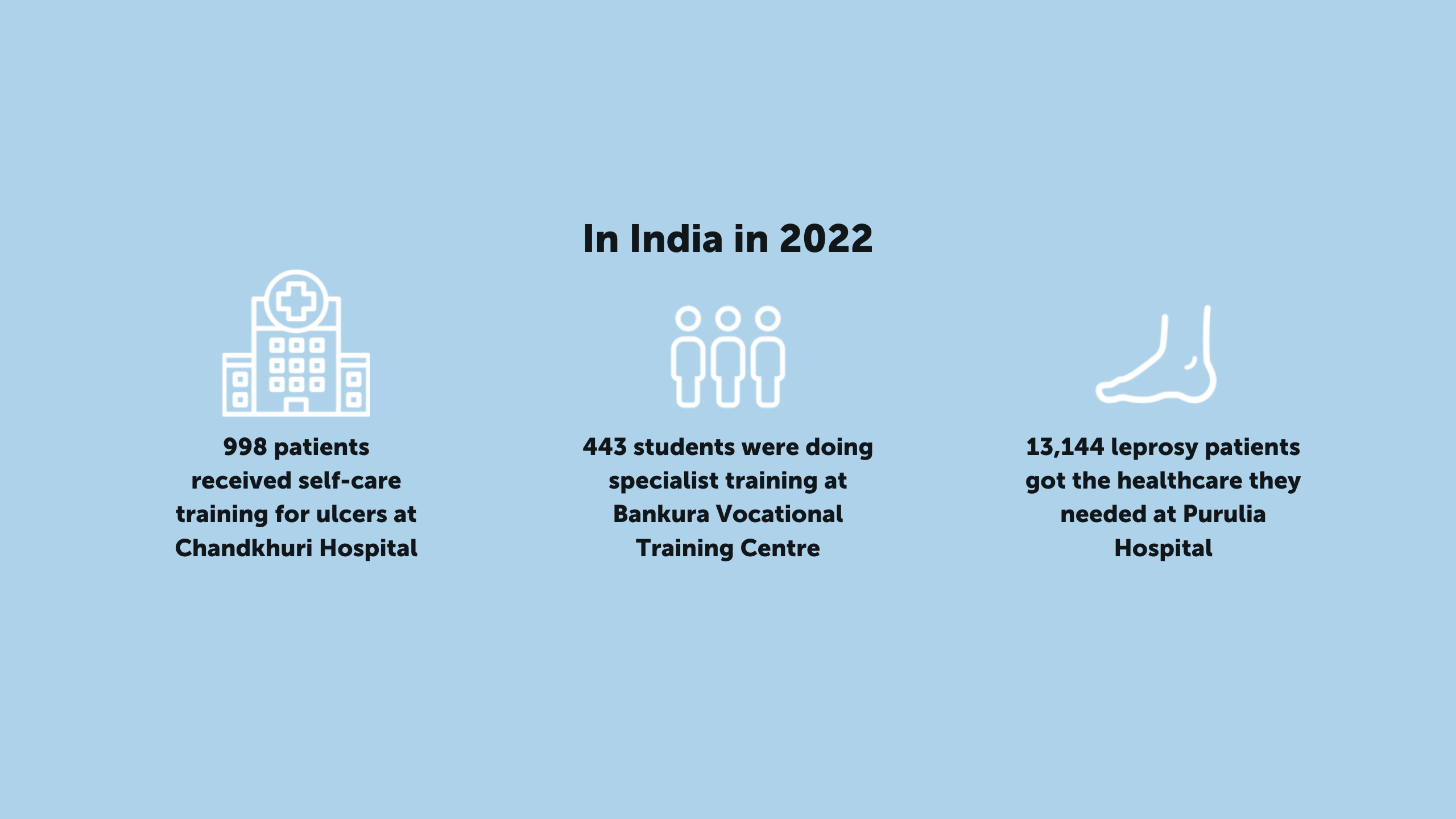

A brand new research centre in Nepal
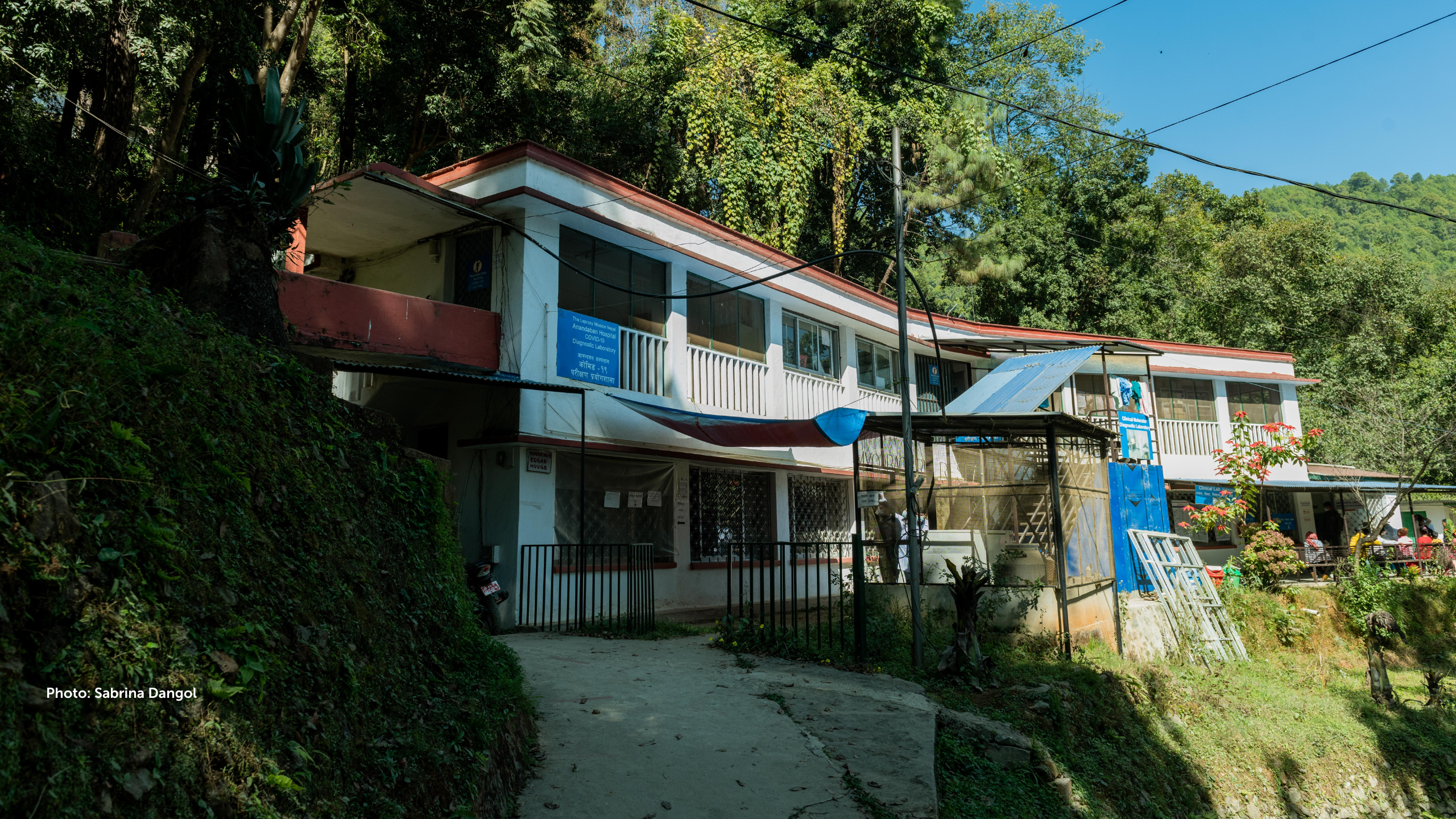
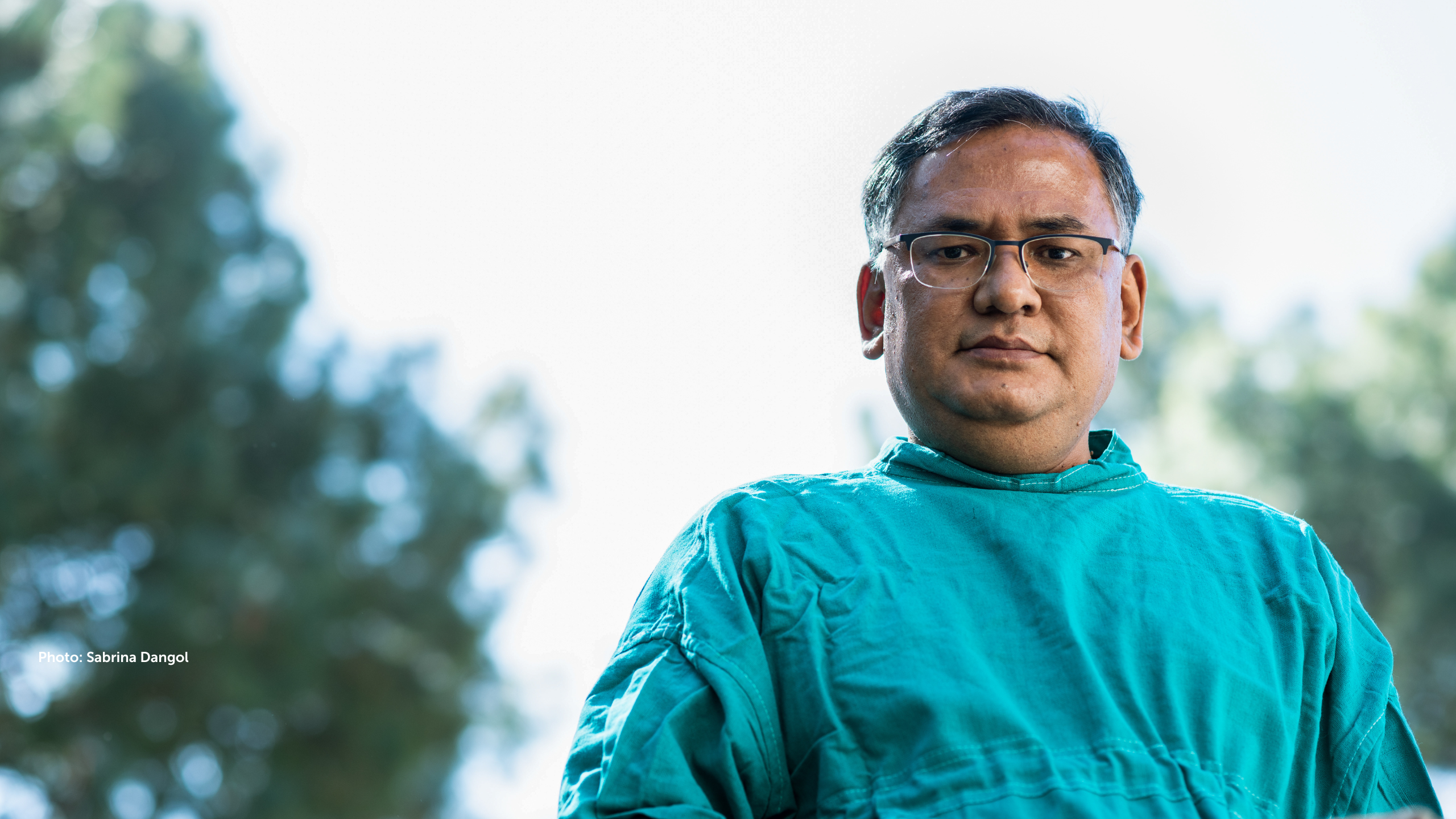


Thanks to you, a brand-new research centre will help to end leprosy forever.
At the beginning of 2022, the future of all research at Anandaban Hospital in Nepal was in jeopardy.
The current hilltop laboratory was no longer fit for purpose and was at risk of being closed by the Government of Nepal. Without this lab, the chance to end leprosy in our lifetime could have been lost forever.
Yet your overwhelming compassion for people affected by leprosy and your determination to fight this disease never wavered. Thanks to your support, our Greater Heights campaign for the laboratory was the most successful in The Leprosy Mission's 149-year history.
As a result of your generosity, we are now planning a new research centre, bringing what was once a dream into reality. Thank you for your never-failing love and your resolve to end leprosy for good.
Above right: The self-care unit at Anandaban Hospital
Above left: Dr Indra is a surgeon and researcher at Anandaban, exploring innovative methods for healing ulcers.
Right: LPRF treatment taking place at Anandaban Hospital. This pioneering technqiue uses the patient's own blood to treat ulcers, and has much quicker recovery times.
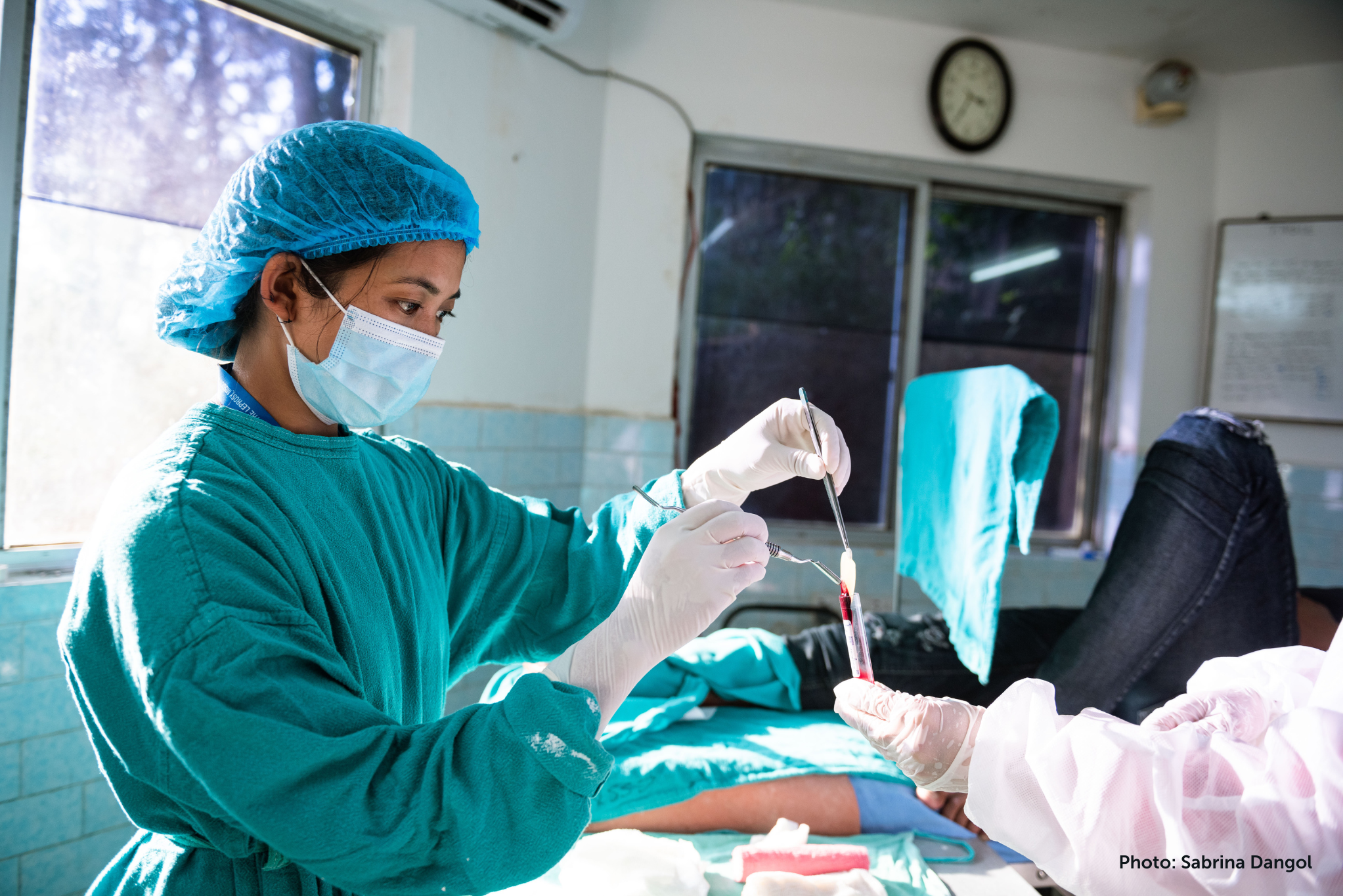
A lifeline in an hour of need
We would like to thank so many of you who commit to regular monthly giving. It is because of your steadfastness that we can plan effectively. Your support also allows us to respond to urgent and unexpected events. Thanks to you, in 2022, we helped people to rebuild their lives after flooding in Bangladesh, provided emergency supplies for those left destitute in Ethiopia, and distributed life-saving food parcels in Sri Lanka.
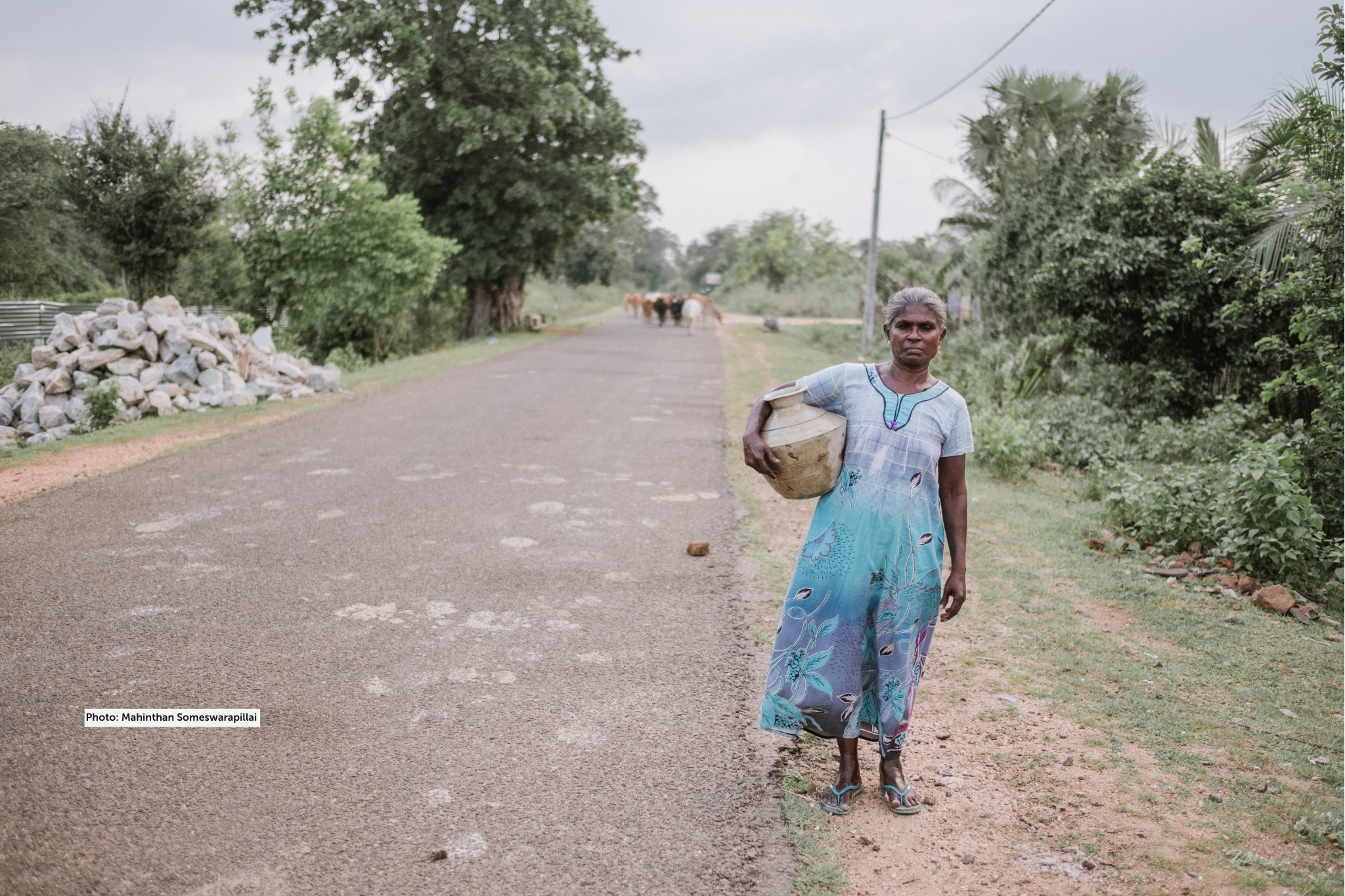
Ethiopia
A two-year war coupled with the worst drought in 40 years led to a major humanitarian crisis in Ethiopia.
Charities, including The Leprosy Mission, urged the international community to provide more aid. We feared for the lives of millions across East Africa. They suffered from acute hunger whilst the eyes of the world focused on Europe. The drought destroyed crops and this desperate situation was made worse by rising food prices caused by the war in Ukraine.
Living in the epicentre of the conflict between the Tigray People's Liberation Front and the Ethiopian government, people in the Amhara region were especially vulnerable. Many affected by disability were unable to flee when violent attacks reached their communities.
Thank you for providing a lifeline for 500 families in this war-torn and drought-ridden area.
It is because of you that these families affected by leprosy and disability received emergency aid packages in April and August. The life-saving packs contained dried food and cooking oil, as well as soap and washing powder. You were there for them when they needed you most and we can never thank you enough.
Above: Kamaladevi, from Sri Lanka, has faced poverty and stigma from her community. People affected by leprosy are often those hardest hit by crises and disasters.
Right: Life-saving emergency aid in Ethiopia, containing food and washing supplies, for people affected by leprosy and with disabilities.
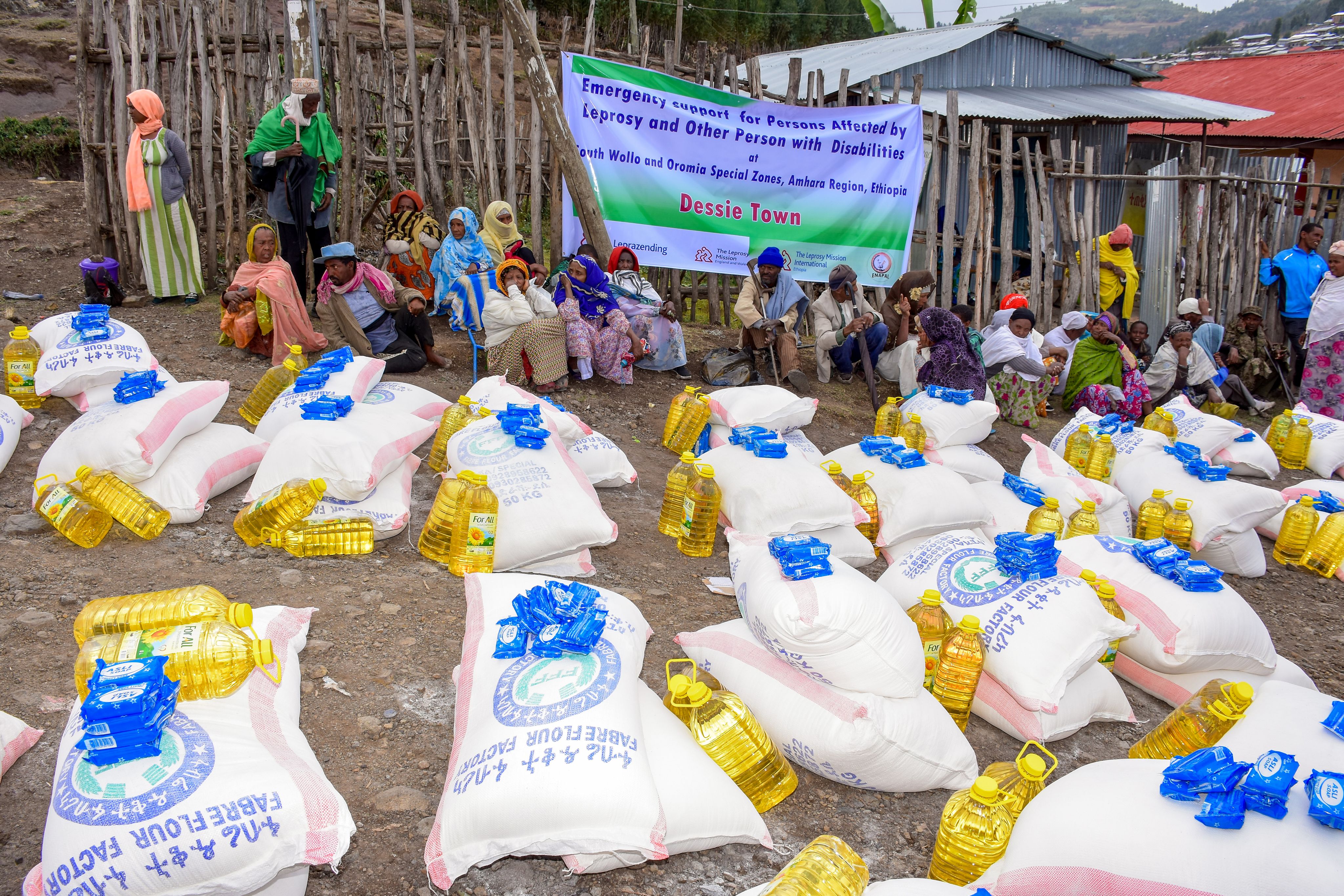
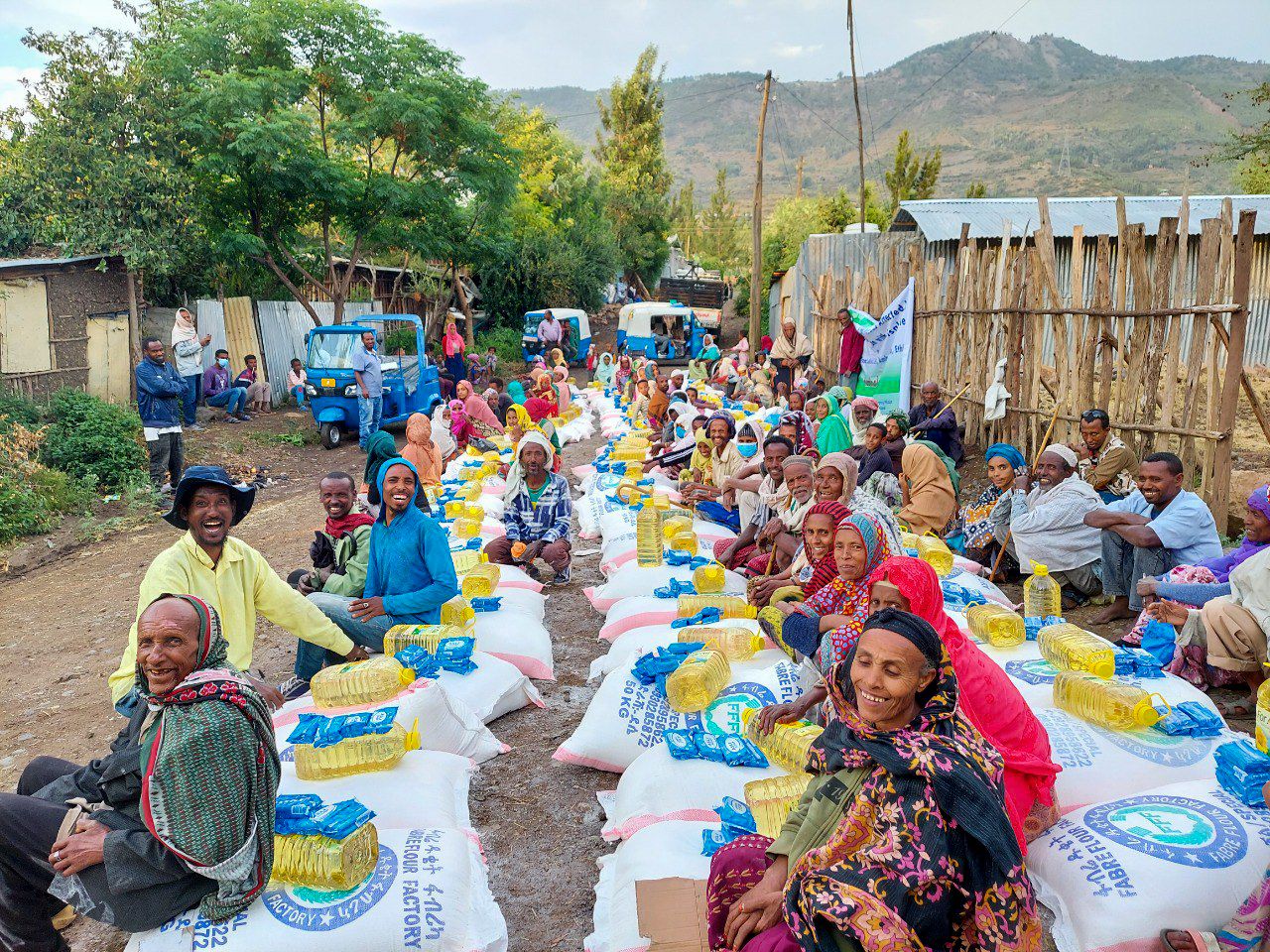
Hidiya's story
A violent attack on Hidiya’s hometown left her stranded and alone. Her disabilities, caused by leprosy, meant she was unable to escape when an armed group attacked. Hidiya was found in her home, traumatised and weak with hunger. She had been completely alone for two weeks. Both her food and drinking water had long run out. She had witnessed horrific kidnappings, beatings, and killings. It is through your kindness and the emergency aid you provided that Hidiya's life was saved.
Hidiya herself asked us to thank you. She said:
"May God bless the people who remembered me during my loneliest time."
Following African Union-mediated talks, the violence finally ended in November. But although the fighting has ceased, restoring the lives of people in Amhara will take time.
We are so grateful for the compassion shown by regular givers. Your generosity saved the lives of countless people in this area last year. Thank you for continuing to support people like Hidiya as they rebuild their lives.
Left: People affected by leprosy and with disabilities receiving emergency aid in the Amhara region of Ethiopia.
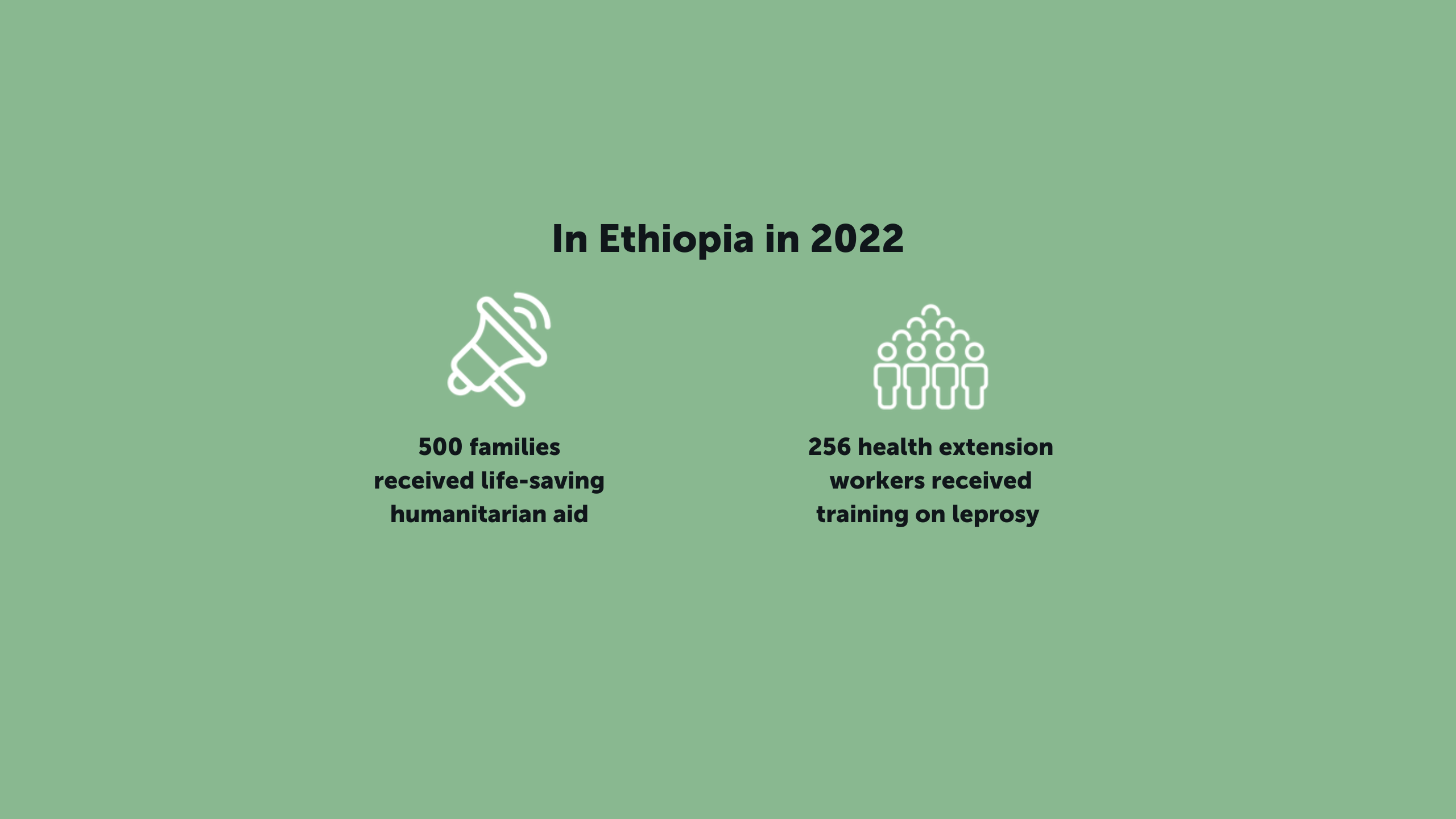

Read more about our mission and goals, our governance, and full financial summary in our Annual Report.
Advocacy
People power can change the world
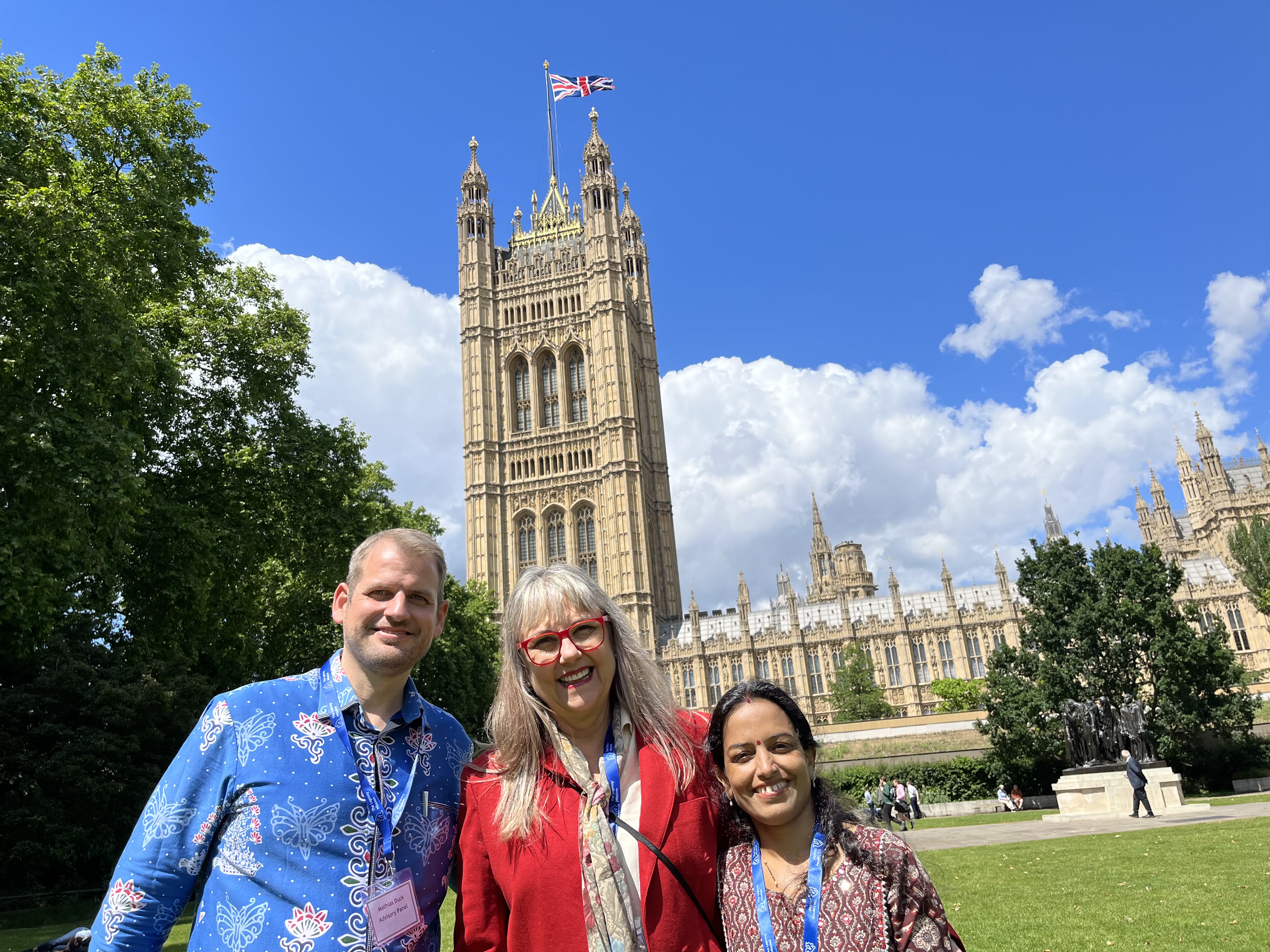
Being an advocate for others can change the world. It might be hard to imagine how sending an email can impact the life of someone with leprosy, but this simple action can set the ball rolling for great things to be achieved. We would like to thank the 800 supporters who did just that by writing to their MPs asking them to attend an event in Parliament.
Leprosy is one of the 20 neglected tropical diseases (NTDs) identified by the World Health Organization. These diseases affect one in five people globally. It is unjust and a sign of inequality that they continue to cause such devastation to the world's poorest people.
To end the injustice, a special event 'Ending the Neglect' was held in June in the House of Lords. This was hosted by the All-Party Parliamentary Group on Malaria and NTDs, and the UK Coalition Against NTDs. Attendees included Lord Trees and Lord Lucas as well as Leprosy Mission staff. The event was attended by MPs, peers, policy advisors and other civil servants.
Three people who have been treated for leprosy also attended the special event. Mathias Duck, who is The Leprosy Mission's Global Advocacy Manager, Dr Zoica Bakirtzief, one of our Trustees, and Rachna Kumari, a campaigner from India.
It was a powerful moment when Rachna stood before some of the most influential people in the UK. She spoke of the prejudice she has endured because of leprosy and called on the UK to step up and play its part in making this treatable disease a thing of the past.
Parliament's Policy Research Unit was inundated with enquiries following the event. Ignited by your passion, MPs were eager to learn more about NTDs. They now know that tackling NTDs will have a major impact on global health and reducing poverty. It is important to remember that these MPs have the vote on how the UK Aid budget is spent.
Thank you for playing your part and standing for people affected by leprosy. By doing so, life-changing seeds have been sown.
Above: Mathias Duck, Dr Zoica Bakirtzief, and Rachna Kumari outside the Houses of Parliament for the Ending the Neglect' in June 2022
Princess Diana's legacy lives on thanks to a generous gift in her name
Princess Diana was famous for bringing people excluded by society out of the shadows. Whether this was people with HIV, the homeless, or leprosy patients, she made a point of reaching out to them.
By holding their hands and showing them love and compassion, she let them know that they were not alone. Through her actions, she brought them into the limelight with her.
In the 1980s and 90s, Princess Diana was the world's most photographed woman. She made headlines in 1989 when, against the instruction of her royal advisors, she was photographed holding the hands of a leprosy patient. By doing so, she showed the world that leprosy was no longer a disease to be feared.
Her passion for helping the most marginalised made a huge impact. It happened at a turning point in the fight against leprosy. Multidrug therapy, the first effective cure, had finally reached all corners of the globe by the mid-90s. More people were being cured of leprosy than ever before and it was a time of great hope and optimism.
Princess Diana became patron of The Leprosy Mission in 1990 and we were honoured to be one of the six charities to retain her patronage in 1996. It was a role she held until her death in 1997. She visited Premananda Hospital in Kolkata, India, and Anandaban Hospital in Nepal.
She spoke passionately at a global anti-leprosy conference held in London in 1996, saying: "It’s always been my concern to touch people with leprosy, trying to show in a simple action that they are not reviled, nor are we repulsed."
25 years after her death, we were delighted to receive a donation of £202,857 from the BBC following investigations into the 1995 Martin Bashir BBC Panorama interview.
Left: A leprosy patient greets Princess Diana at Anandaban Hospital, Nepal, in 1993.
